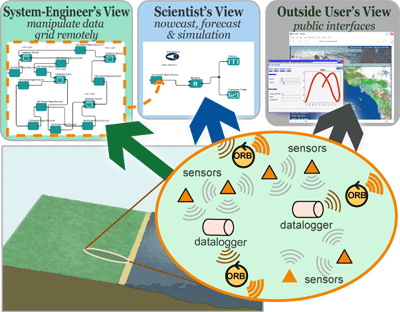





|
|


|
|
||
 |
|
|
This is version 11.
It is not the current version, and thus it cannot be edited. REAP (Realtime Environment for Analytical Processing) is an NSF-funded cyberinfrastructure development project, focused on creating technology in which scientific workflows tools can be used to access, monitor, analyze and present information from field-deployed sensor networks, for both the oceanic and terrestrial environments, and across multiple spatiotemporal scales. This near real-time environment for analytical processing will provide an open-source, extensible and customizable framework for designing and executing scientific models that consume data streams from sensor networks. Project investigators will combine the real-time data grid being constructed through other projects (ROADNet, CENS ESS, OPeNDAP, EarthGrid) with the scientific workflow system Kepler (http://kepler-project.org)  . These open-source software frameworks represent considerable prior investments. . These open-source software frameworks represent considerable prior investments. 
The tools developed by REAP are intended to be broadly relevant to individual researchers, as well as scientists involved with emerging integrated monitoring frameworks such as NEON-- the National Ecological Observatory Network (http://neoninc.org The REAP project consists of oceanographers, marine and terrestrial ecologists, technologists, and computer science researchers working closely together to construct, test and deploy these new technology systems. The REAP solutions are intended to serve three distinct communities-- the scientific research community for data access, analysis and modeling (researcher’s view); systems managers, for the monitoring and control of real-time sensor networks (engineer’s view); and finally, to facilitate the public’s scientific understanding and awareness of the state of the environment (layperson’s view).
Work will progress by building upon existing cyberinfrastructure efforts, drawing on the experience of teams involved with constructing the Kepler Development of the REAP tools will be strongly guided by the needs and advice of representatives from each of the three communities that the tools are expected to service. An initial focus will involve refining two scientific use cases, to clarify the specific issues and challenges that researchers face in critical areas involving analysis of oceanographic, terrestrial ecological, and ultimately integrated ocean-land topics. These use cases are currently scoped as follows:
Attachments:
|
| This material is based upon work supported by the National Science Foundation under award 0619060. Any opinions, findings and conclusions or recomendations expressed in this material are those of the author(s) and do not necessarily reflect the views of the National Science Foundation (NSF). Copyright 2007 |